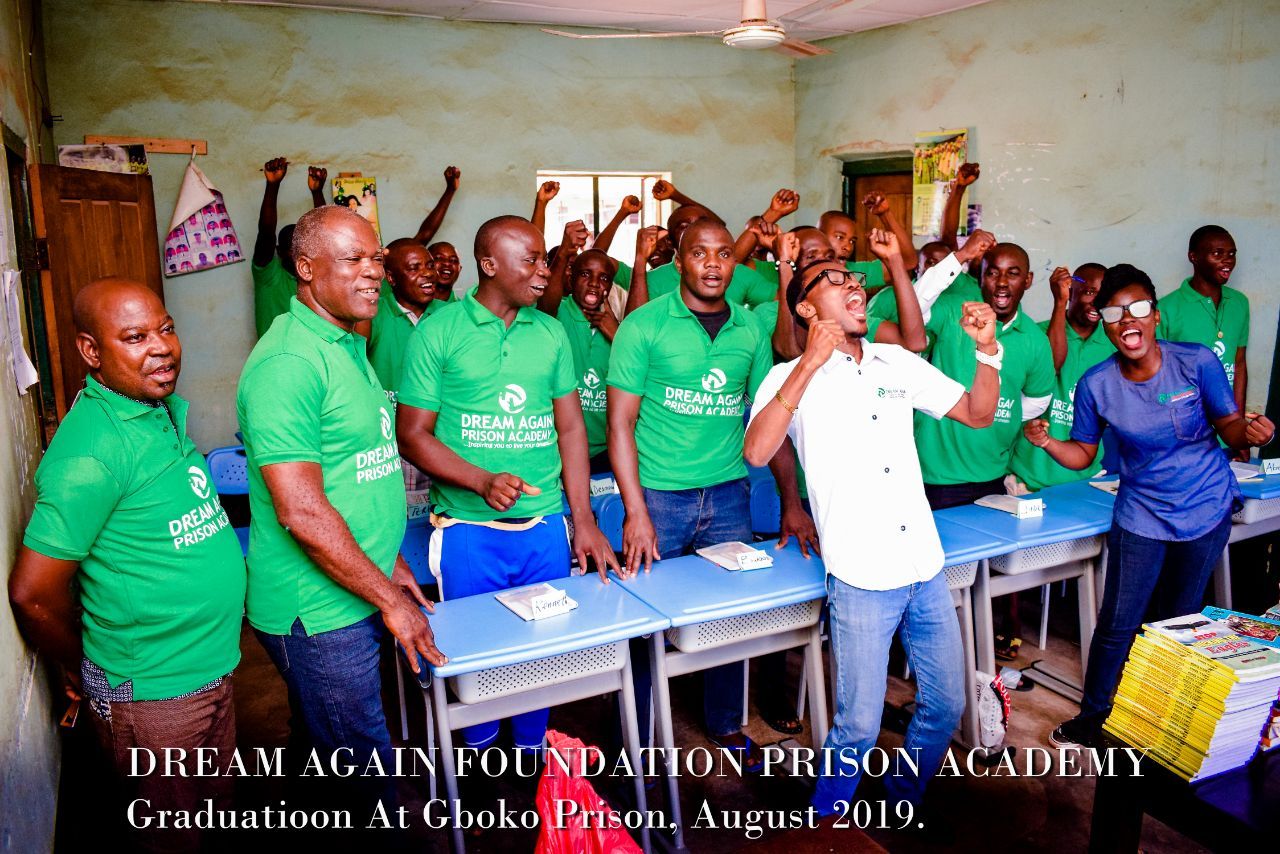OTUKPO, BENUE: Emmanuel Kusa had great plans for himself and his future. He was four months into completing his training in tailoring in May 2017, and he had hoped to set up his own tailoring business afterwards.
But all those plans crashed when the 29-year-old was accused of stealing a motorcycle, arrested by the police, convicted and jailed for one year in Benue State. He denied committing the crime and insisted he was wrongly accused, convicted and imprisoned.
When he came out of prison in 2018, he tried getting a job within Otukpo, his community, but he could not secure one because his prison records discouraged employers from engaging him.
The rejection means Kusa was having difficulty reintegrating back into society. But fortunately, while in prison, a nonprofit had helped him learn some skills and techniques for reintegrating into his community. And those skills came in handy.
A global problem
Like Kusa, ex-convicts around the world face social adaptation issues. Sometimes, rejection, stigmatisation and ostracisation could force ex-convicts to repeat crimes such as theft, burglary and robbery to survive. This relapse to crime is called recidivism.
Statistics show that there has been a steep rise in recidivism in Nigeria: 35% in 2007, 44% in 2008, 52.4% in 2010, and 50% in 2019. Globally, between 20 to 63% of ex-convicts relapse into crime within two years after their release from prison.
In August 2019, President Muhammadu Buhari signed the Nigerian Correctional Service Bill into law. Section 14 focuses on the reformation and rehabilitation of inmates through educational and vocational training. But due to funding shortfalls, its implementation remains weak.
‘Dream Again’
In June 2017, a team from a non-governmental organisation (NGO) called Dream Again Prison and Youth Initiative (Dream Again) came to Gboko Correctional Centre in Benue, where Kusa served his jail term and organised rehabilitation and livelihood programmes for inmates with permission from prison authorities.
Kusa was one of 20 inmates who participated in the three-month training. Dream Again trained inmates in leadership, entrepreneurship, and community development using a group of psychologists, social workers, and entrepreneurs. Inmates also had the opportunity to read inspirational and educational books in a small library set up by the nonprofit in the prison.
During the period, Kusa learnt how to make cream, antiseptics, and soap. So when he could not get a job after his jail term, Kusa decided to put his soap-making skills to use. Dream Again was happy to support him with a hydrometer, an instrument he uses to measure and determine the concentration of chemicals.
He has sustained his soap-producing business since then. And he feels happy with his level of growth. “The program is changing my life. I make at least N5 000 ($12.17) from the soap making every week if there is no shortage… I am happy they helped me,” he said.
Like Kusa, Ngbebe Francis was convicted and jailed at Igah Correctional Center in Benue for bridging a trust in August 2015 at Home Track Ventures Nigeria Limited – a beer-distribution firm where he worked as a manager in its Benue branch. Dream Again supported him with a sewing machine to set up his tailoring business when he left prison in 2018.
And last year, when 27-year-old Francis gained admission to study marketing at Benue State Polytechnic, the nonprofit gave him N35 000 ($85.19) to pay his tuition fee. He is currently in his second year studying for his National Diploma.
“It is good to realise your mistakes, and I learnt that the downfall of a man is not the end,” Francis said. “Apart from receiving free training in the prison, I had the opportunity of reading educational books. [In fact], I was given three books when I was leaving the prison.”
“Others can be transformed too”
Bashiru Adamu, Dream Again’s founder, said the motivation to establish the nonprofit began from his home. Adamu grew up in a family where he was often not allowed to express himself or share his opinions about what affected him. This made him feel lonely but forced him to develop an interest in reading books to pass away from his lonely times.
The fifth of seven children, Adamu used to frequent his brother’s library to read inspirational books. When his craving for knowledge grew, he started dreaming of setting up a library for his Narayi Community in Kaduna State.
“I was amazed at my transformation, and that is why I considered the idea of setting up a community library,” 42-year-old Adamu said. “Since books have transformed me, I believe others can be transformed by books too.”
Adamu’s idea materialised in 2012 while rendering his compulsory national service under the National Youth Service Corps in Benue State. During the period, Adamu set up his first small library in Otukpo Correctional Centre in Benue with the help of friends and colleagues who donated educational and inspirational books and money.
Later, when his friends agreed to join him as volunteers, he formalised the effort and registered it as Dream Again Prison and Youth Initiative. The initiative now boasts of five staff and eight volunteers.
Dream Again has empowered over 2000 inmates in six prisons in Benue, Lagos, and Kaduna states and the federal capital, Abuja, since it launched in June 2012.
In 2017, Adamu received a grant of $100,000 from Strive Masiyiwa – Zimbabwe’s richest man and founder of Econet Wireless, a telecommunication company operating in several African countries – to scale his effort. Other sponsors include LEAP Africa, Purple Foundation Africa, and Catalyst Australia.
On why he chose a prison for his first library, he said: “I have never been incarcerated, but I understand that if you have access to books while in the correctional centre, your time in the prison won’t be a waste. Reading books while in prison will encourage and give you hope to come out and do something meaningful.”
The group sets up small libraries in all the prisons it visits. But when Adamu noticed there was no rehabilitation program for inmates, his foundation began livelihood training for the prisoners. When they (prisoners) were out of jail, he followed up on some to know how to support them to start their small businesses or return to school.
The group now uses a three-step strategy – Rethink, Reform, and Re-enter – to rehabilitate inmates and prepare them to reintegrate into society after their prison terms. Adamu said Rethink involves using psychologists, social workers, and other experts to provide mental support to inmates. The inmates are then trained in tailoring and the production of products like cream, antiseptics, and soap under Re-form. Re-enter involves giving material and financial support to the prisoners to help them restart life once out of prison.
“For some of them, their families no longer accept them… So we motivate and inspire them to say no to crime. This is our own little way of reducing recidivism in the society,” Adamu said.
However, some ex-convicts who benefitted say they received training from Dream Again months or years before completing their prison term. They complain that Dream Again has no structure to help them practice what they learned while still in prison, so some inmates forget their learned skills before they leave prison.
One told PRIME PROGRESS that Dream Again could, for example, work with prison authorities to set up small barbershops in the prisons where those trained in barbing can volunteer to perfect their skills.
But for Kusa, he is glad for his training in prison. “I am so happy bearing in mind my one-year stay in prison was not in vain,” he said. “I see it as going there to learn.”
Emmanuel Kusa, a trainee tailor from Otukpo, Benue, saw his plans crumble when he was wrongfully accused of theft and imprisoned in 2017. Upon release, societal rejection hindered his reintegration. Fortunately, skills acquired from Dream Again Prison and Youth Initiative during incarceration helped him launch a soap-making business.
This issue of recidivism is global, with Nigeria seeing rising rates of ex-convicts re-offending. The Nigerian Correctional Service law aims to reform and rehabilitate inmates but suffers from funding issues.
Dream Again, founded by Bashiru Adamu, seeks to mitigate these challenges by offering educational and vocational training to inmates. Since its inception in 2012, Dream Again has empowered over 2000 inmates in Nigerian prisons through programs focused on leadership, entrepreneurship, and community development.
While some beneficiaries, like Kusa and Francis, have positively transformed their lives post-incarceration, others suggest more practical training opportunities within prison premises to retain learned skills. Adamu's organization continues to strive, supported by diverse sponsors, to reduce recidivism and facilitate better societal reintegration for ex-convicts.






